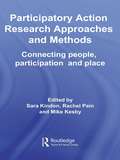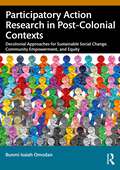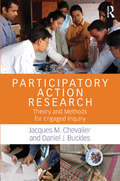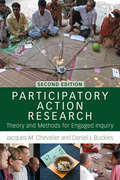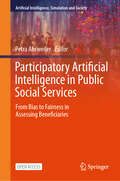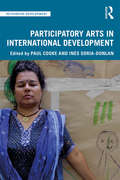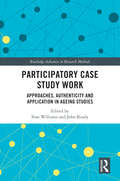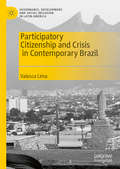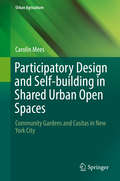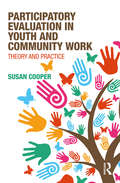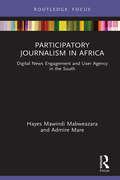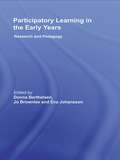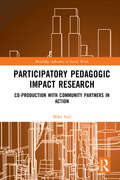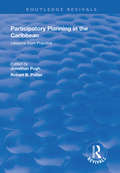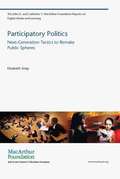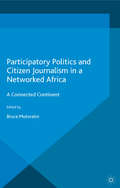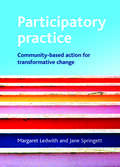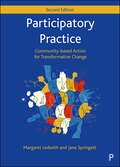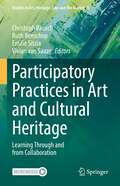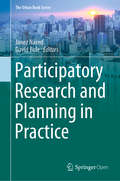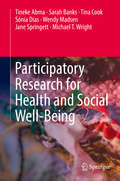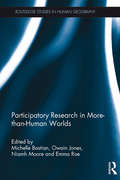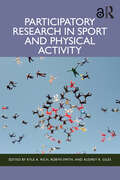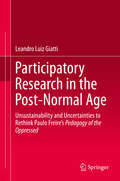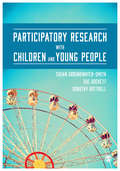- Table View
- List View
Participatory Action Research Approaches and Methods: Connecting People, Participation and Place (Routledge Studies in Human Geography)
by Rachel Pain Mike Kesby Sara KindonParticipatory Action Research (PAR) approaches and methods have seen an explosion of recent interest in the social and environmental sciences. PAR involves collaborative research, education and action which is oriented towards social change, representing a major epistemological challenge to mainstream research traditions. It has recently been the subject of heated critique and debate and rapid theoretical and methodological development. This book captures these developments, exploring the justification, theorisation, practice and implications of PAR. It offers a critical introduction to understanding and working with PAR in different social, spatial and institutional contexts. The authors engage with PAR’s radical potential, while maintaining a critical awareness of its challenges and dangers. The book is divided into three parts. The first part explores the intellectual, ethical and pragmatic contexts of PAR; the development and diversity of approaches to PAR; recent poststructuralist perspectives on PAR as a form of power; the ethic of participation; and issues of safety and well-being. Part two is a critical exploration of the politics, places and practices of PAR. Contributors draw on diverse research experiences with differently situated groups and issues including environmentally sustainable practices, family livelihoods, sexual health, gendered experiences of employment, and specific communities such as people with disabilities, migrant groups, and young people. The principles, dilemmas and strategies associated with participatory approaches and methods including diagramming, cartographies, art, theatre, photovoice, video and geographical information systems are also discussed. Part three reflects on how effective PAR is, including the analysis of its products and processes, participatory learning, representation and dissemination, institutional benefits and challenges, and working between research, action, activism and change. The authors find that a spatial perspective and an attention to scale offer helpful means of negotiating the potentials and paradoxes of PAR. This approach responds to critiques of PAR by highlighting how the spatial politics of practising participation can be mobilised to create more effective and just research processes and outcomes. The book adds significant weight to the recent critical reappraisal of PAR, suggesting why, when, where and how we might take forward PAR’s commitment to enabling collaborative social transformation. It will be particularly useful to researchers and students of Human Geography, Development Studies and Sociology.
Participatory Action Research in Post-Colonial Contexts: Decolonial Approaches for Sustainable Social Change, Community Empowerment, and Equity
by Bunmi Isaiah OmodanParticipatory Action Research in Post-Colonial Contexts provides a comprehensive exploration of Participatory Action Research (PAR) as a transformative methodology uniquely suited to post-colonial contexts, explicitly addressing the ongoing impact of colonial legacies and systemic inequalities in knowledge production and social change.Integrating critical theory, methodological insights, and vivid case studies, this book highlights how PAR empowers marginalised communities, advances social justice, and promotes sustainable development. Readers will benefit from practical strategies for navigating ethical complexities, addressing power imbalances, and ensuring the enduring impact of participatory research. Key features include an in-depth examination of decolonial frameworks, guidance on measuring and sustaining social change, and innovative methods integrating digital technology to scale participatory initiatives.Ideal for graduate students, researchers, lecturers, and practitioners in sociology, anthropology, education, development studies, and environmental justice, this text also serves as essential reading for policymakers and activists committed to equity-driven research and community empowerment.
Participatory Action Research: Theory and Methods for Engaged Inquiry
by Jacques M. Chevalier Daniel J. BucklesThis book addresses a key issue in higher learning, university education and scientific research: the widespread difficulty researchers, experts and students from all disciplines face when trying to contribute to change in complex social settings characterized by uncertainty and the unknown. More than ever, researchers need flexible means and grounded theory to combine people-based and evidence-based inquiry into challenging situations that keep evolving and do not lend themselves to straightforward technical explanations and solutions. In this book, the authors propose innovative strategies for engaged inquiry building on insights from many disciplines and lessons from the history of Participatory Action Research (PAR), including French psychosociology. The ongoing evolution of PAR has had a lasting legacy in fields ranging from community development to education, public engagement, natural resource management and problem solving in the workplace. All formulations have in common the idea that research must be done ‘with’ people and not ‘on’ or ‘for’ people. Inquiry of this kind makes sense of the world through efforts to transform it, as opposed to simply observing and studying human behaviour and people’s views about reality, in the hope that meaningful change will happen somewhere down the road. The book contributes many new tools and conceptual foundations to this longstanding tradition, grounded in real-life examples of collective fact-finding, analysis and decision-making from around the world. It provides a modular textbook on participatory action research and related methods, theory and practice, suitable for a wide range of undergraduate and postgraduate courses, as well as working professionals.
Participatory Action Research: Theory and Methods for Engaged Inquiry
by Jacques M. Chevalier Daniel J. BucklesFully revised and updated, this second edition of Participatory Action Research (PAR) provides new theoretical insights and many robust tools that will guide researchers, professionals and students from all disciplines through the process of conducting action research ‘with’ people rather than ‘for’ them or ‘about’ them. PAR is collective reasoning and evidence-based learning focussed on social action. It has immediate relevance in fields ranging from community development to education, health, public engagement, environmental issues and problem solving in the workplace. This new edition has been extensively revised to create a user-friendly textbook on PAR theory and practice, including: updated references and a comprehensive overview of different approaches to PAR (pragmatic, psychosocial, critical); more emphasis on the art of process design, especially in complex social settings characterized by uncertainty and the unknown; developments in the use of Web2 collaborative tools and digital strategies to support real-time data gathering and processing; updated examples and stories from around the world, in a wide range of fields; critical commentaries on major issues in the social sciences, including stakeholder theory, systems thinking, causal analysis, monitoring and evaluation, research ethics, risk assessment and social innovation. This modular textbook provides novel perspectives and ideas in a longstanding tradition that strives to reconnect science and the inquiry process with life in society. It provides coherent and critical treatment of core issues in the ongoing evolution of PAR, making it suitable for a wide range of undergraduate and postgraduate courses. It is intended for use by researchers, students and working professionals seeking to improve or rethink their approach to co-creating knowledge and supporting action for the well-being of all.
Participatory Artificial Intelligence in Public Social Services: From Bias to Fairness in Assessing Beneficiaries (Artificial Intelligence, Simulation and Society)
by Petra AhrweilerThis open access edited volume focuses on fairness issues concerning the use of artificial intelligence (AI) for social service provision in national welfare systems. With this, it touches upon important questions in the innovation agenda of countries across continents about the ethics, justice, quality, responsibility, accountability, and transparency to use AI for state functions. The volume shows that in many countries, AI, or at least data analytics methods, are already in place to support the assessment of beneficiaries for deciding on the value criteria to distinguish between legal /fraudulent, deserving/non-deserving, or needy/non-needy recipients. The book provides a cross-cultural comparison of AI-based social assessment among national welfare systems of 9 countries across 4 continents: Spain, Estonia, Germany, Iran, India, Nigeria, Ukraine, China and USA. Based on participatory research results from multi-stakeholder inputs, especially those from vulnerable groups, the chapters in this volume show that value criteria for fairness and social justice are context-bound and vary across the globe. Furthermore, they are in constant flux, aligned to social change. Thus, the volume looks at pathways to developing culture-sensitive, responsive and participatory AI for social assessment in public service provision. The contributions are interdisciplinary and introduce perspectives from the fields of sociology, computational social science, computer science and public policy. This topical volume is of interest to a wide readership.
Participatory Arts in International Development (Rethinking Development)
by Paul Cooke Inés Soria-DonlanThis book explores the practical delivery of participatory arts projects in international development. Bringing together an interdisciplinary group of academics, international development professionals and arts practitioners, the book engages honestly with the competing challenges faced by the different groups of people involved. Participatory arts are becoming increasingly popular in international development circles, fuelled in part by the increased accessibility of audio-visual media in the digital age, and also by the move towards participatory discourses in the wake of the UN’s Agenda 2030. The book asks: What do participatory arts projects look like in practice, and why are they used as an international development tool? How can we develop practical and sustainable development projects on the ground, localising best practice according to cultural, economic and linguistic contexts? What are the enablers of, and barriers to, successful participatory initiatives, and how can we evaluate past projects to learn and feed into future projects? Written to appeal to both academics and practitioners, this book would also be suitable for teaching on courses related to participatory development, community arts, and culture and development.
Participatory Case Study Work: Approaches, Authenticity and Application in Ageing Studies (Routledge Advances in Research Methods)
by Sion Williams and John KeadyParticipatory Case Study Work shows academic co-researchers how to adapt and implement their methods so that data collection and analysis is authentically participatory. At the heart of this text is advocating a participatory approach to case study work, with co-construction as a catalyst for shared understanding and action in advancing ageing studies. Whilst case study research has a relatively long tradition in the canon of research methodologies, little attention has so far been paid to the importance and value of participatory case study work. This is surprising as its egalitarian and democratic value-base naturally lends itself to the co-production and co-creation of personal and collective theory drawn directly from lived experience. The book brings together over 15 years’ worth of participatory case study work in ageing studies in which the editors have been actively involved as either front-line researchers or as supervisors to PhD and MPhil studies adopting the methodology, and from where each of the contributors are selected. Real-life case examples are shared in the main chapters of the book and they provide direction as to how learning can be applied to other settings. The chapters also contain key references and recommended reading. This volume will appeal to undergraduate and postgraduate students as well as postdoctoral researchers interested in fields such as: Research Methods, Qualitative Methods, Ageing Studies and Mental Health Studies.
Participatory Citizenship and Crisis in Contemporary Brazil (Governance, Development, and Social Inclusion in Latin America)
by Valesca LimaThis book discusses the issues of citizen rights, governance and political crisis in Brazil. The project has a focus on “citizenship in times of crisis,” i.e., seeking to understand how citizenship rights have changed since the Brazilian political and economic crisis that started in 2014. Building on theories of citizenship and governance, the author examines policy-based evidence on the retractions of participatory rights, which are consequence of a stagnant economic scenario and the re-organization of conservative sectors. This work will appeal to scholarly audiences interested in citizenship, Brazilian politics, and Latin American policy and governance.
Participatory Design and Self-building in Shared Urban Open Spaces: Community Gardens And Casitas In New York City (Urban Agriculture Ser.)
by Carolin MeesThe book investigates the development of community gardens with self-built structures, which have existed as a shared public open space land use form in New York City’s low-come neighborhoods like the South Bronx since the 1970s. These gardens have continued to be part of the urban landscape until today, despite conflicting land use interests, changing residents groups and contradictory city planning. Both community gardens and self-built structures are created in a participatory design and self-built effort by urban residents and are an expression of the individual gardeners’ preferences, their cultural background and the decisions made by the managing residents’ group in regards to the needs of their neighborhood. Ultimately community gardens with self-built structures are an expression of the people’s will to commonly use this land for open and enclosed structures next to their homes in the city and need to be included in future urban planning.
Participatory Evaluation in Youth and Community Work: Theory and Practice
by Susan CooperEvaluation is an essential element of professional practice. However, there is little in the literature that is designed to help students involve and support young people in evaluating the impact of youth work activities. This comprehensive book explores current thinking about evaluation in the context of youth work and community work and offers both theoretical understanding and practical guidance for students, practitioners, organisational leaders and commissioners. Part 1 provides underpinning knowledge of the origins, purpose and functions of evaluation. It charts the developments in evaluation thinking over the past 50 years, and includes an exploration of ‘theory of change’. Concepts such as impact, impact measurement and shared measurement are critically examined to illustrate the political nature of evaluation. Findings from empirical research are used to illuminate the challenges of applying a quasi-experimental paradigm of evaluation of youth and community work. Part 2 introduces the reader to participatory evaluation and presents an overview of the histories, rationale and underpinning principles. Empowerment evaluation, collaborative evaluation and democratic evaluation are examined in detail, including practice examples. Transformative Evaluation, an approach specifically designed for youth and community work, is presented. Part 3 focuses on the ‘doing’ of participatory evaluation and offers guidance to those new to participatory evaluation in youth and community work and a helpful check for those already engaging. It provides valuable information on planning, methods, data and data analysis and processes for sharing knowledge. This essential text will enable the reader to reconstruct evaluation as a tool for learning as well as a tool for judging value. It provides a comprehensive reference, drawing on a wide range of literature and practice examples to support those involved in youth and community work to develop and implement participatory approaches to evaluating and communicating the meaning and value of youth and community work to a wider audience.
Participatory Journalism in Africa: Digital News Engagement and User Agency in the South (Disruptions)
by Admire Mare Hayes Mawindi MabweazaraThis book offers an African perspective on how news organisations are embracing digital participatory practices as part of their everyday news production, dissemination and audience engagement strategies. Drawing on empirical evidence from news organisations in sub-Saharan Africa, Participatory Journalism in Africa investigates and maps out professional practices emerging with journalists’ direct interactions with readers and sources via online user comment spaces and social media platforms. Using a social constructivist approach, the book focuses on the challenges relating to the elite-centric nature of active participation on the platforms, while also highlighting emerging ethical and normative dilemmas. The authors also point to the hidden structural controls to participation and user engagement associated with artificial intelligence, chatbots and algorithms. These obstacles, coupled with low digital literacy levels and the well-established pitfalls of the digital divide, challenge the utopian view that in Africa interactive digital technologies are the sine qua non spaces for democratic participation. This is a valuable resource for academics, journalists and students across a wide range of disciplines including journalism studies, communication, sociology and political science.
Participatory Learning in the Early Years: Research and Pedagogy (Routledge Research in Education)
by Eva Johansson Jo Brownlee Donna BerthelsenThe early years are an important period for learning, but the questions surrounding participatory learning amongst toddlers remain under-examined. This book presents the latest theoretical and research perspectives about how ECEC (Early Childhood Education and Care) contexts promote democracy and citizenship through participatory learning approaches. The contributors provide insight into national policies, provisions, and practices and advance our understandings of theory and research on toddlers’ experiences for democratic participation across a number of countries, including the UK, Australia, New Zealand, the United States, Canada, Sweden, and Norway.
Participatory Pedagogic Impact Research: Co-production with Community Partners in Action (Routledge Advances in Social Work)
by Mike SealInvolvement of community partners in the structure and design of services is largely accepted in principle, but its practice is heavily contested. This book argues that the co-production of research is one of the best ways to involve community partners. As well as having intrinsic value in and of itself, research embeds a culture of learning, co-production and of valuing research within organizations. It also creates a mechanism for developing evidence for, monitoring and evaluating subsequent ideas and initiatives that arise from other co-production initiatives. The book makes a case for research to be a synthesis of participatory research, critical pedagogy, peer research and community organizing. It develops a model called Participatory Pedagogic Impact Research (PPIR). Participatory research is often criticized for not having the impact it promises. PPIR ensures that the issues chosen, and the recommendations developed, serve the mutual self-interest of stakeholders, are realistic and realizable. At the same time this approach pushes the balance of power towards the oppressed using methods of dissemination that hold decision makers to account and create real change. PPIR also develops a robust method for creatively identifying issues, methods and analytic frameworks. Its third section details case studies across Europe and the United States of PPIR in action with professional researchers’ and community partners’ reflections on these experiences. This book gives a unique articulation of what makes for genuinely critical reflective spaces, something underdeveloped in the literature. It should be considered essential reading for both participatory research academics and those involved in health and social care services in the planning, commissioning and delivery of services.
Participatory Planning in the Caribbean: Lessons from Practice
by Robert Potter Jonathan PughThis title was first published in 2003. Until recently, planning and development in the Caribbean have been "top-down", "centre-out" and "expert-led". For a few years now, though, the region has bowed to the global trend and has experimented with participatory planning methods. Participatory planning is heralded by much of the development community as the most appropriate alternative strategy to the traditional approaches. In this volume, a range of experts drawn from the Caribbean, the United Kingdom and the United States review the current achievements and future prospects for genuinely participative planning in the Caribbean region at the beginning of the 21st Century. Bringing together a wide range of case studies from both the insular Caribbean as well as mainland Central and South America, the book examines issues such as protected area planning, sustainable development councils, gender and development, inner-city redevelopment and community empowerment.
Participatory Politics
by Elisabeth SoepAlthough they may disavow politics as such, civic-minded young people use every means and media at their disposal to carry out the basic tasks of citizenship. Through a mix of face-to-face and digital methods, they deliberate on important issues and debate with peers and powerbrokers, redefining some key dynamics that govern civic life in the process. In Participatory Politics, Elisabeth Soep examines the specific tactics used by young people as they experiment with civic engagement. Drawing on her scholarly research and on her work as a media producer and educator, Soep identifies five tactics that are part of effective, equitable participatory politics among young people: Pivot Your Public (mobilizing civic capacity within popular culture engagements); Create Content Worlds (using inventive and interactive storytelling that sparks sharing); Forage for Information in public data archives; Code Up (using computational thinking to design tools, platforms, and spaces for public good); and Hide and Seek (protecting privacy and information sources). After describing these tactics as they manifest themselves in a range of youth-driven activities -- from the runaway spread of the video Kony 2012 to community hackathons -- Soep discusses concrete ideas for cultivating the new literacies that will enable young people to participate in public life. She goes on to consider some risks associated with these participatory tactics, including simplification and sensationalism, and ways to avoid them, and concludes with implications for future research and practice.
Participatory Politics and Citizen Journalism in a Networked Africa: A Connected Continent
by Bruce MutsvairoThis book investigates the role of citizen journalism in railroading social and political changes in sub-Saharan Africa. Case studies are drawn from research conducted by leading scholars from the fields of media studies, journalism, anthropology and history, who uniquely probe the real impact of technologies in driving change in Africa.
Participatory Practice 2E: Community-based action for transformative change
by Margaret Ledwith Jane SpringettIn this second edition of a bestselling book, the authors’ unique, holistic and radical perspective on participatory practice has been updated to reflect advances made in the past decade, the impact of neoliberalism and austerity and the challenges of climate change and the pandemic. Bridging the divide between community development ideas and practice, over half of this innovative book comprises new content with updated features including: • Reflection questions • Key points highlighted throughout each chapter • Glossary of terms The authors argue that transformative practice begins with everyday stories about people’s lives and that practical theory generated from these narratives is the best way to inform both policy and practice. This long-awaited second edition will be of interest to academics and community-based practitioners working in a range of settings, including health and education.
Participatory Practice: Community-based Action for Transformative Change
by Margaret Ledwith Jane SpringettIn this second edition of a bestselling book, the authors’ unique, holistic and radical perspective on participatory practice has been updated to reflect advances made in the past decade, the impact of neoliberalism and austerity, and the challenges of climate change and the pandemic. Bridging the divide between community development ideas and practice, over half of this innovative book comprises new content with updated features including: • reflective questions • key points highlighted throughout each chapter • a glossary of terms The authors argue that transformative practice begins with everyday stories about people’s lives and that practical theory generated from these narratives is the best way to inform both policy and practice. This long-awaited new edition will be of interest to academics and community-based practitioners working in a range of settings, including health and education.
Participatory Practices in Art and Cultural Heritage: Learning Through and from Collaboration (Studies in Art, Heritage, Law and the Market #5)
by Christoph Rausch Ruth Benschop Emilie Sitzia Vivian Van SaazeThis edited volume analyzes participatory practices in art and cultural heritage in order to determine what can be learned through and from collaboration across disciplinary borders. Following recent developments in museology, museum policies and practices have tended to prioritize community engagement over a traditional focus on collecting and preserving museal objects. At many museal institutions, a shift from a focus on objects to a focus on audiences has taken place. Artistic practices in the visual arts, music, and theater are also increasingly taking on participatory forms. The world of cultural heritage has seen an upsurge in participatory governance models favoring the expertise of local communities over that of trained professionals. While museal institutions, artists, and policy makers consider participation as a tool for implementing diversity policy, a solution to social disjunction, and a form of cultural activism, such participation has also sparked a debate on definitions, and on issues concerning the distribution of authority, power, expertise, agency, and representation. While new forms of audience and community engagement and corresponding models for “co-creation” are flourishing, fundamental but paralyzing critique abounds and the formulation of ethical frameworks and practical guidelines, not to mention theoretical reflection and critical assessment of practices, are lagging.This book offers a space for critically reflecting on participatory practices with the aim of asking and answering the question: How can we learn to better participate? To do so, it focuses on the emergence of new norms and forms of collaboration as participation, and on actual lessons learned from participatory practices. If collaboration is the interdependent formulation of problems and entails the common definition of a shared problem space, how can we best learn to collaborate across disciplinary borders and what exactly can be learned from such collaboration?
Participatory Research and Planning in Practice (The Urban Book Series)
by Janez Nared David BoleThis open access book provides in-depth insights into participatory research and planning by presenting practical examples of its use. In particular, it describes theoretical and methodological aspects of participatory research and planning, as well as the implementation of participatory processes in fields such as transport planning, cultural heritage management, environmental planning and post-earthquake recovery. Further, it compares participatory planning experiences from different territorial levels – from the macro-regional, e.g. Southeastern Europe, Mediterranean or European metropolitan regions, to national, regional and local levels.The book will help researchers, planners, public administration officials, decision-makers and the general public to understand the advantages, disadvantages and constraints of participatory planning and research. Using various examples, it will guide readers through the theory of participatory planning and research, its methods, and different perspectives on how to use it in practice.
Participatory Research for Health and Social Well-Being
by Sarah Banks Wendy Madsen Jane Springett Michael T. Wright Tineke Abma Tina Cook Sónia DiasThis textbook is a comprehensive guide for students interested in using participatory research to improve people’s health and well-being. It is especially designed for those working in the fields of health and social welfare who are embarking on participatory research for the first time. It covers all phases in participatory research from “getting started,” to “acting for change,” “continuing the journey” and “articulating impact.” Its unique format helps readers understand the essence of participatory research as a comprehensive approach for doing research which is underpinned by a set of fundamental values.The many real life examples of participatory research projects from around the world inspire readers to find creative ways to manage their own research while opening up new horizons in their work.
Participatory Research in More-than-Human Worlds (Routledge Studies in Human Geography)
by Owain Jones Emma Roe Niamh Moore Michelle BastianSocio-environmental crises are currently transforming the conditions for life on this planet, from climate change, to resource depletion, biodiversity loss and long-term pollutants. The vast scale of these changes, affecting land, sea and air have prompted calls for the ‘ecologicalisation’ of knowledge. This book adopts a much needed ‘more-than-human’ framework to grasp these complexities and challenges. It contains multidisciplinary insights and diverse methodological approaches to question how to revise, reshape and invent methods in order to work with non-humans in participatory ways. The book offers a framework for thinking critically about the promises and potentialities of participation from within a more-than-human paradigm, and opens up trajectories for its future development. It will be of interest to those working in the environmental humanities, animal studies, science and technology studies, ecology, and anthropology.
Participatory Research in Sport and Physical Activity (Qualitative Research in Sport and Physical Activity)
by Robyn Smith Kyle A. Rich Audrey R. GilesThis is the first book to focus on participatory research in the context of sport and physical activity. It explores the transformative potential of participatory research methods and provides an introduction to the practicalities of doing participatory research in sport and physical activity.The book is structured around phases of the research process, covering research design, data collection, data analysis, and knowledge mobilization and translation. Chapters cover research design topics such as building research partnerships, reflexivity and ethical issues; methods such as social photo-elicitation, go-along interviews, and biographical mapping; analytical approaches such as collective memory work and collaborative analysis; and knowledge mobilization and translation topics such as podcasting, digital tools, and peer review. Every chapter includes a review of key developments, a guide to how that approach can be employed, an example from the author’s own work, and critical reflections on how that approach can shape future research and have an impact on public discourse.This book is an invaluable resource for students and researchers working in sport studies, the sociology of sport, sport and exercise psychology, sport management and policy, and human movement and health studies more broadly. It will be particularly useful for those interested in diverse and inclusive approaches to qualitative research methodologies.
Participatory Research in the Post-Normal Age: Unsustainability and Uncertainties to Rethink Paulo Freire's Pedagogy of the Oppressed
by Leandro Luiz GiattiThis book shows how participatory research can provide tools to overcome the current epistemic and ethical challenges faced by traditional scientific approaches. Ever since Funtowicz and Ravetz proposed the notion of post-normal science, there has been a growing awareness of the limits of a form of knowledge production based only on the traditional scientific peer communities that excludes other social groups affected by its results and applications. The growing uncertainty and complexity posed by socio-ecological issues in the interactions between science, society and decision making has revealed the importance of a social quality control over crucial decisions that rely on scientific research and the necessary democratization of knowledge to tackle sustainability and health concerns.Departing from a reinterpretation of Paulo Freire’s Pedagogy of the Oppressed, this volume shows how participatory research can contribute to reconnect science and society by extending peer communities through the incorporation of different forms of knowledge and different social actors into research projects. To do so, the author presents a critical review of different participatory research approaches, identifying the elements that distinguish a true participatory research from a traditional one, and proposing a taxonomy of the various participatory methodologies. The volume also analyzes a diversity of social practices and understandings that deal with an ecology of knowledge and its systemic characteristics. Moreover, it demonstrates that uncertainties can be integrated in dialogical processes that open possibilities for a myriad of outcomes. Participatory Research in the Post-Normal Age - Unsustainability and Uncertainties to Rethink Paulo Freire's Pedagogy of the Oppressed will be of interest to researchers working with participatory approaches in different fields like health, environmental sciences, and education, as well as to practitioners of action research concerned with scientific dilemmas and counter-hegemonic strategies.
Participatory Research with Children and Young People
by Susan Groundwater-Smith Sue Dockett Dorothy BottrellThis book sets out a clear framework for conducting participatory research with children and young people within a discussion of the rights of the child. Through extensive case studies and a close review of contemporary literature, in relation to early childhood through to late adolescence, the book serves as a critical guide to issues in participative research for students and researchers. The book includes chapters on: Designing your research project Ethical considerations Innovative methods Publication and dissemination.
